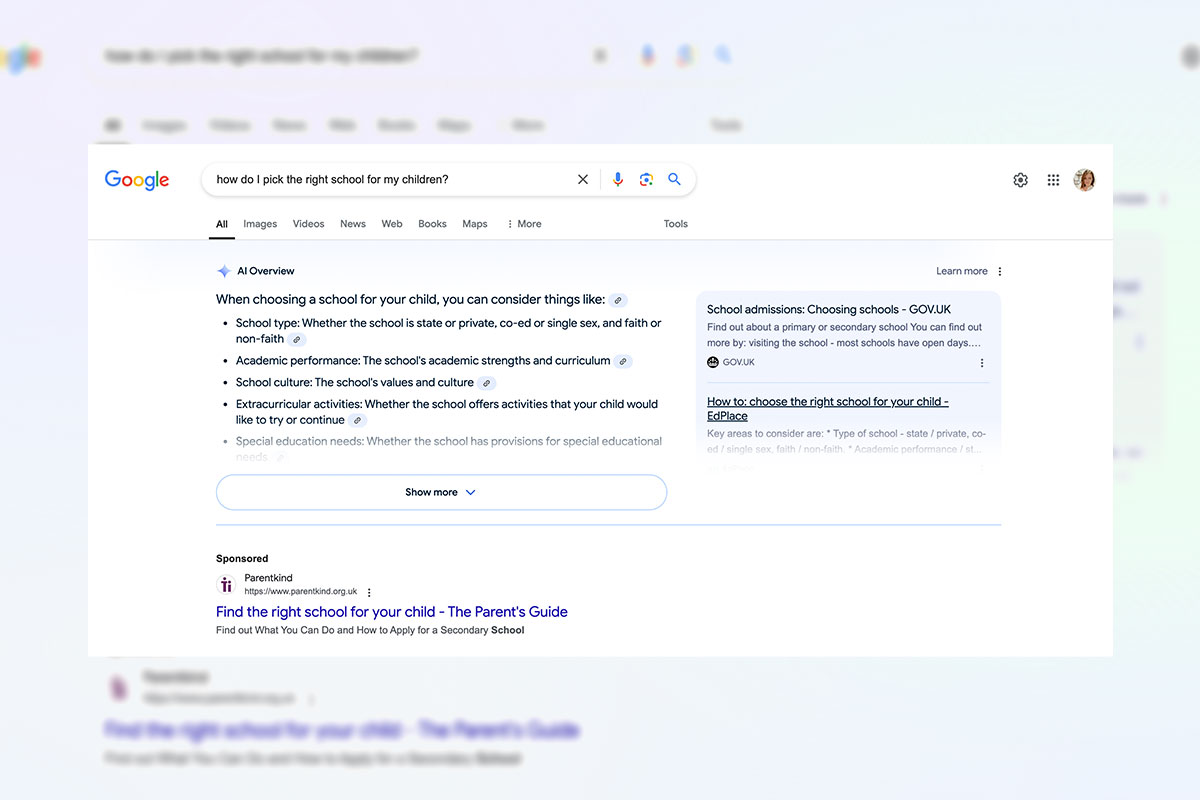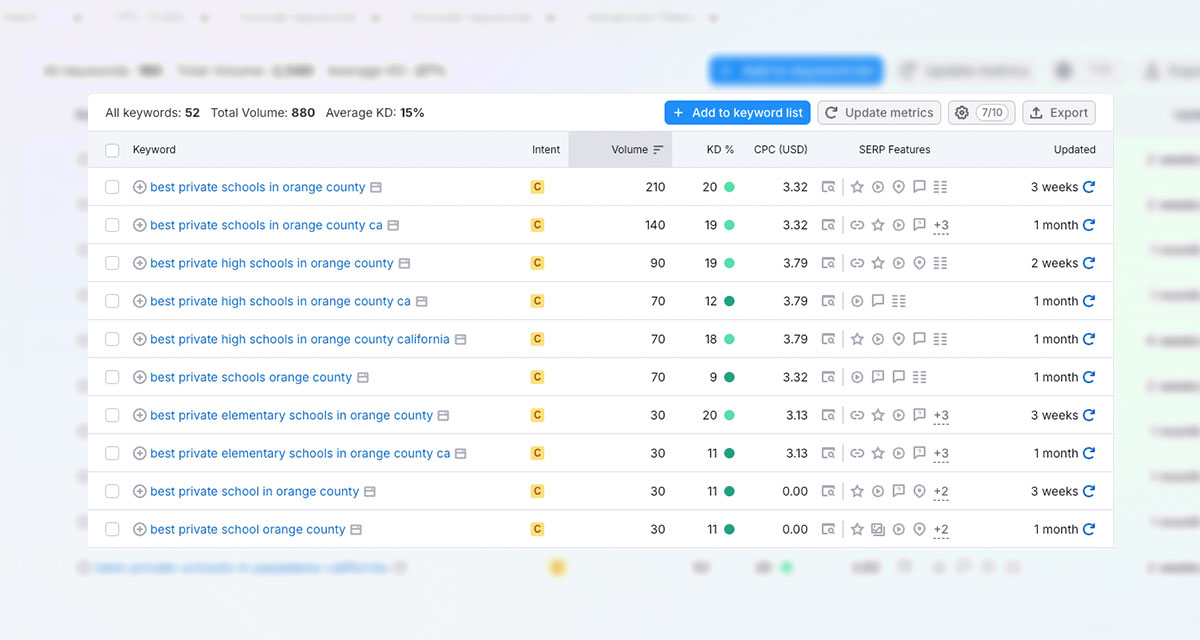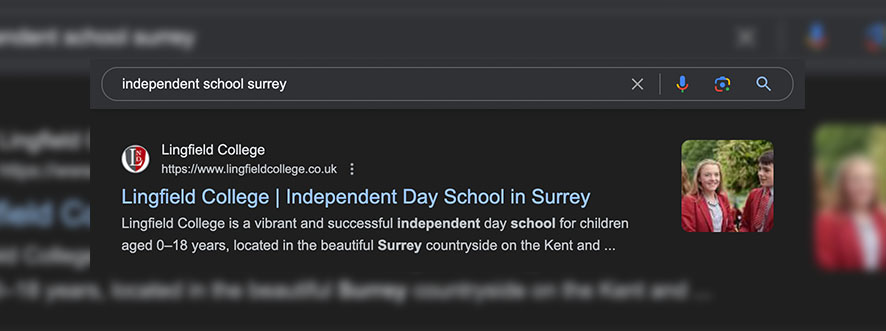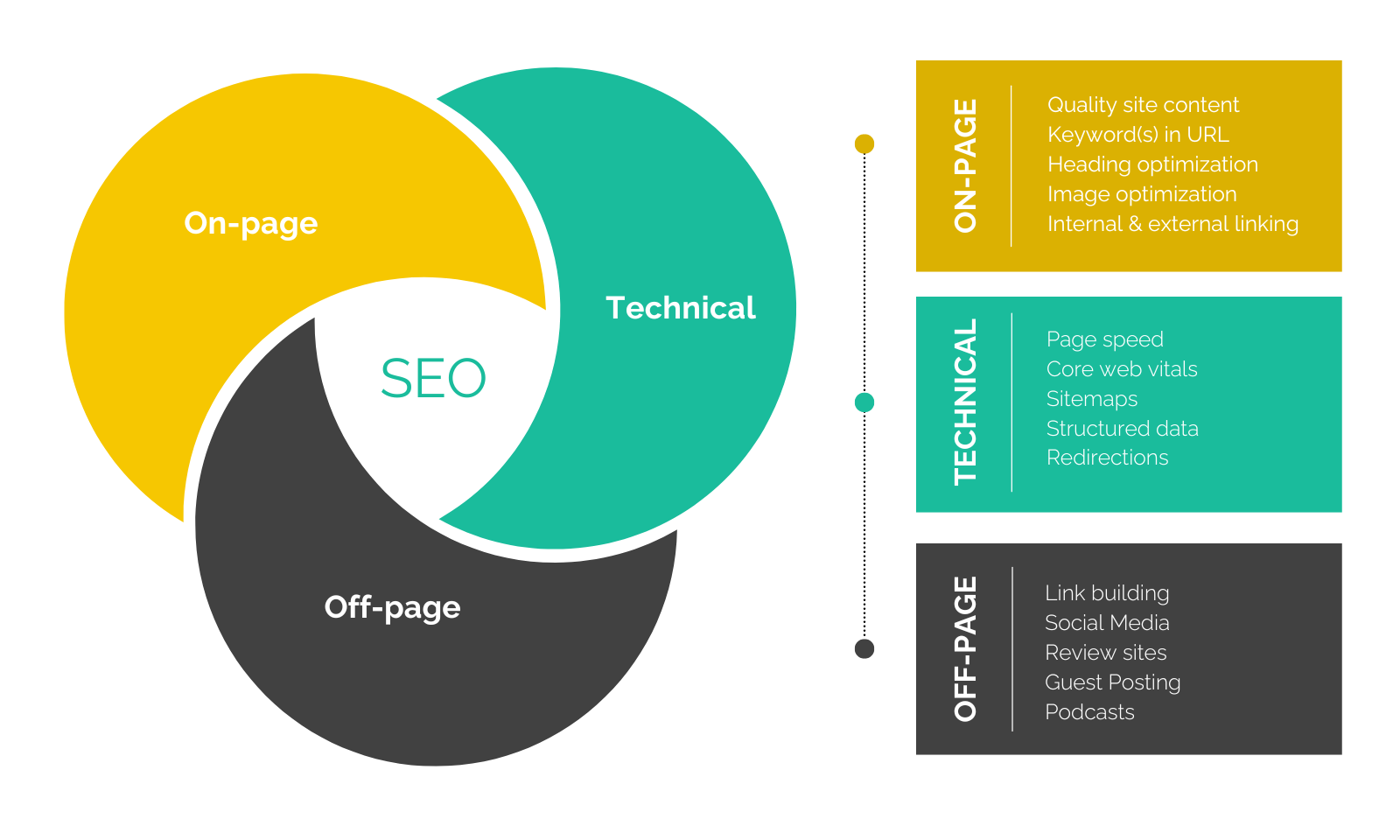SEO for Schools: Proven Strategies for Better Rankings
In the rapidly evolving tech space of 2024, it's crucial for marketers to remember the enduring significance of SEO for schools. Despite the rise of AI technologies, Google search continues to command the search landscape with over 90% of all global searches.
Yet search engine results pages (SERPs) have changed. A lot.
- ✨ AI Overviews
Since May 2024, Google has introduced AI overviews to address more complex queries. While these have not (yet) replaced featured snippets, they are significantly influencing both visibility and CTR (click-through rate).
- Ad Prioritization
Google is prioritizing more paid advertisements above organic results than ever, making visibility tougher.
- Algorithm Adjustments
Google is - once again - penalizing outdated tactics. Recently, weak link-building strategies were on the chopping block, which has added extra turbulence into the mix.
These changes mean improving school SEO it increasingly difficult for marketers.
Do Schools Still Need to Focus on SEO?
You might wonder if investing in SEO is still worthwhile for your school. Considering that organic traffic accounts for over half of all online traffic, the answer is a resounding yes.
The dramatic drop in click-through rates (CTR) from 39.8% at the first position to 18.7% at the second underscores the critical impact of SEO on your school's admission funnel.
SEO remains one of the most affordable ways to help your school website reach the top and stay there, it doesn’t happen overnight — it takes practice and patience.
SEO Tips for Private Schools
Intrigued? Not sure where to start? We've got you covered. We've put together the best tips and strategies you can use to improve your school's SEO, to achieve better search engine rankings and online visiblity. Let's dive in...

1. Keyword Research
Keyword research is the foundational step in any successful SEO strategy. It involves identifying the words and phrases potential students and parents use when searching for schools.
Start by brainstorming terms related to your school's offerings, such as "private high school in [city]" or "STEM programs for middle school." It might be helpful to think about:
- Location-based Terms
Think about what people would search for when thinking of schools in a commutable distance to you. For instance, "private schools in [city name]".
- Specific Programs or USP's
These search terms would highlight usp's of your school. Examples could include International Baccalaureate program, Advanced Placement program, or sports scholarships etc.,
- Common Queries
Address some of the frequently asked questions parents might have about educational options and outcomes.
- Include Both Broad and Niche queries
Focus on both broad and specific long-tail keywords. This will help you capture both high search volume terms as well as bottom-of-funnel and very specific queries effectively.
 |
|
Keyword research tools
Once you have a list, the magic really happens when you start parsing it through keyword research tools. Utilizing tools like Google's Keyword Planner or SEMrush will help you uncover wich keywords have the highest search volume and cross reference that against how competitive each term is (in other words, how hard it would be to rank highly for).
Depending on what you use, you may also discover some new keyword ideas as part of this process. You can use free and/or paid tools to assist in your keyword discovery - here are some of the best out there:
- Moz Keyword Explorer - An excellent all-around SEO keyword research tool that's free to use
- Google Keyword Planner - Perfect for researching paid keywords
- Semrush or AHREF's - More advanced insights for SEO professionals.
- RyRob Free Keyword Research Tool - Super simple to use, and free!
Forming a keyword strategy
The next stage involves taking all the newly found data you've uncovered and giving it structure, so that you can make informed decisions on your SEO strategy.
Putting aside the more complex aspects of SEO (like evaluating backlinks), a basic approach that will work for most school marketers who are starting out, is to:
- group your keywords into clusters of similar content and keywords
- Then sort these clusters by potential traffic volume
- And finally review how competitive they are (often referred to as keyword difficulty)
This will give you a list of 'low hanging fruit' terms that will be easiest to target with maximum traffic potential.

It's really important to remember that search intent should also play a BIG part in deciding which keywords to target. In the example above, there are a couple of things to note:
- It's highly likely that since the user is searching for 'best schools' (plural) in many cases, they may be specifically looking for comparison pages from impartial sources like Niche.com. In instances like this you may be better off considering PPC advertising.
- Don't be tempted to broaden your target keywords geography just for the sake of higher volumes. Consider what the user really wants and how far they are willing to commute each day rather than chasing after higher potential traffic numbers.
Optimizing for Branded vs Unbranded Keywords
When conducting keyword research - it's just as important to consider terms that include your school name (branded terms). After all if a user already knows about your school because you're local of through word of mouth and are willing to search for you, it means they've already got a higher intent to take action.
Find out which branded term(s) will generate the most traffic for you and make sure to target those as part of your strategy. It's most common to optimize your homepage with the primary branded keyword.
2. Content Creation & Optimization
Create Quality Content
You've identified some great keywords to target - now what? The real work begins with creating high-quality, relevant content for your target audine.
Creating relevant, engaging, and informative content helps attract visitors and keep them on your site longer. A good indicator for whether your content is Your content should addresses common questions and showcases your school's unique offerings. Consider developing:
- Blog articles on educational topics. These can vary from
- Articles about what's taking place in the school
- Videos that highlight your school's unique selling points and extracurricular activities
- Program descriptions
- Student and parent testimonials
Ensure your content includes the keywords identified in your research, naturally woven into the narrative, to improve search visibility without appearing forced. As part of your production process, don't be afraid to scope out your competition so you can ensure your copy is one step ahead.
Are you writing enough?
Check the pages that already rank highly in SERPs and compare them with yours. Do you cover off all the topics they do, and more? Do you source any content that needs additional validation? Ensuring your content is comprehensive enough and answers all the questions your users might have
Don't shy away from AI.
AI writing tools aren't in a position to replace talented humans (yet). But tools like perplexity.ai make incredible resources to help spark new ideas, find suitable sources and outline page content. In other words, they're fantastic at speeding up the writing process and getting you to 'draft 1' faster than you could alone. Just be sure to proof everything carefully!
Leveraging "Shoulder Niches" in Your SEO Strategy
Effective education SEO hinges on the creation of engaging, high-quality content. However, what approach should you take if your niche is perceived as less exciting? Crafting compelling content about education can present challenges.
This is where "shoulder niches" come into play. This strategy involves creating content that aligns closely with topics that have broader appeal and then integrating your specific insights. For instance, trending topics such as parenting tips, social-emotional wellness, and social media usage among teens can provide a perfect platform for your school to showcase its expertise, resources, or perspectives. These areas offer valuable opportunities to generate insightful blog posts or discussions about how your school's programs effectively address these contemporary issues.
3. On-page Optimization
On-page optimization involves refining what's on your individual web pages, so that they rank higher and earn more relevant traffic.
Once you have compelling content at the ready, it goes without saying that the terms need to feature directly in the text on your webpage but, this process also includes optimizing title tags, meta descriptions, headers, and images with targeted keywords. Let's dive in.
Meta titles & descriptions
Meta title's and descriptions are not visible on the webpage itself, but are what search engines show a preview of in their search engine results pages. Altering these headings and descriptions won't directly influence your SERP position. However, they've been proven to positively influence click-through rates when keywords match search queries. As shown in the example below, the matching text in the users search query is emboldened in the meta description.

When writing your meta title's aim for between 50-60 characters, and for descriptions aim for 150-160 characters. This is because anything over that will likely be cut short. Google and other search engines do however change these limits without notice.
Use Headings and Titles Appropriately
Heading tags are an important indicator of what your web page is about, to you users as well as to search engines. Whilst comprehensive and reader friendly content is still the most important ranking factor - using well structured headings that include your keyword focus is important to help search engines understand your page.
"When it comes to text on a page, a heading is a really strong signal telling us this part of the page is about this topic"
John Mueller - Google Search Advocate
Headings don't just alter the styling of your webpage, they have back-end code that looks like this:

It's advisable to use one unique < h1 > tag on any page of your site, and to use heading tags in order (for example don't skip from a heading 2 tag, to a heading 6 tag). If you're finding that the formatting doesn't fit your needs by using your heading tags in the appropriate order then speak to your web development agency who will be able to help resolve that.
Body content optimization
Sprinkling keywords into your page content is known as 'baking-in' to SEOs. But it's easy to get carried away and stuff keywords into your text. Whilst baking-in isn't a dark art, you should be careful not to cram keywords into your text in an unnatural way as you could be penalised for this.
For optimum content use these handy prompts:
- Are you writing enough? Check the pages that already rank highly in SERPs and compare them with yours. Do you cover off all the topics they do, and more? Do you source any content that needs additional validation? Ensuring your content is comprehensive enough and answers all the questions your users might have
- Don't shy away from AI. AI writing tools aren't in a position to replace talented humans (yet). But tools like perplexity.ai make incredible resources to help spark new ideas, find suitable sources and outline page content. In other words, they're fantastic at speeding up the writing process and getting you to 'draft 1' faster than you could alone. Just be sure to proof everything carefully!
- State the obvious. Some users won't know what academic abbreviations mean. Never assume knowledge with your readers, and try to keep language easy to digest. Using tools like Grammarly or plugins like Yoast (if you're on a Wordpress website) can help you understand your Flesch readability score. Aim for 60-70 in terms of readability score, unless the page is a very niche topic.
- Include a variety of formats. Where it's appropriate, help users understand your school and your web content better by supplimenting it with images, quotations, videos and attachments.
- Understand your users intent. If all the other pages ranking higher in search results for a keyword are blog articles, don't try and rank for that term using a sales page. Understand whether your user is just gathering data, or if they're further down their decision making funnel, and ready to book a tour. That will help guide you in providing appropriate content for the page. Remember pages with better engagement also see rank higher.
- Use Structured Markup where relevant. To try and rank for rich snippets, make sure your content utilizes structured data. Structured data (or markup) is back end code that users a standardized schema. This information tells search engines that there is a specific type of data on the page, for example for reviews, events or frequently asked questions.
If you are using a Wordpress CMS site, there are several plugins like Yoast SEO or RankMath that will help you understand how well your page content is optimized. There are also some basic free tools like Wincher that
Image alt text
Whilst it's getting smarter every day, Google and other search engines don't automatically understand what content is included in your imagery. Ensure image (except for decorative imagery) has descriptive alt text that helps search engines understand what it contains and include your keywords where appropriate.
If you're using the AMAIS content managment system, it's as simple as double clicking your image and filling in this field:

This not only helps spiders understand a context for your webpage, you may also find your images ranking in image searches. SEO aside, this is something schools should be doing anyway as improves accessibility, by allowing users who need screen readers to understand the content of your images too.
Internal Linking
Strategically placing internal links within your content encourages visitors to explore related topics and discover more about your school's offerings, increasing time spent on your site. For instance, when discussing the school's STEM programs, include links to individual pages detailing specific courses or success stories related to that program.
 |
John Mueller - Google Search Advocate |
Moreover, internal links assist in guiding search engines as they crawl your website, improving the overall structure and helping important pages rank better in search engine results. Having a link ecosystem around specific keyword clusters helps to build topical authority. Be mindful to use anchor text for relevant searches, as this not only aids in context but also boosts search engine understanding of your site's content.
4. Optimize for Local Search
For schools, local SEO is crucial. Did you know that a whopping 46% of searches on google are for local searches. Even more staggering is that an estimated 15% of local searches lead to an offline conversion. That makes your schools local SEO, worth paying attention to.
Your first steps to ensure visibility and that Google ranks you for local searches should include:
- Claim and optimize your Google Business Profile
- Ensure consistent NAP (Name, Address, Phone) information across all online listings including your social accounts and review sites
- Encourage reviews from parents and students
- Weave location-specific content throughout your site, in line with your keyword research (hint, you can be a little subtler in your approach than the Thai restaurant above 😉)
- GMB now allows you to directly update your social profiles so make sure those are up to date.
5. Build Quality Backlinks
Backlinks (also referred to as inbound links) from other websites, play a significant role in education SEO. They act as endorsements of your site's content, signaling to search engines that your school is reputable and authoritative as well as driving extra traffic.
To build quality backlinks, collaborate with other reputable education focussed websites. These could be:
- Local businesses and community organizations
- Educational blogs
- Popular review sites
- Alumni networks
- Other education institutions (e.gFeeder schools
Consider guest blogging on education-focused sites or hosting events that garner media coverage. Each backlink from a reputable website strengthens your school's domain authority, improving your search engine ranking.

6. Improve Technical SEO & Run an Audit on Your Website
Technical SEO focuses on optimizing the backend of your website to improve search engine crawling and indexing. Address basic technical aspects to improve your site's performance:
- Ensure your site is mobile-friendly. Google started mobile-first crawling and indexing websites as of 2016, so it's crucial your site is accessible on mobiles and tablets.
- Improve page load speeds. Experience signals on your website, including 'core web vitals' are a ranking factor. This means that assuming you have equally strong content as your competing schools, but your site is slower to load and less user friendly, you will receive less organic traffic. Use tools like Pagespeed Insights or Google Search Console's Page Expereince and Core web vitals reports to understand where you need to improve.
- Create an XML sitemap and to request a re-crawl it whenever major changes take place in Google search console to ensure Google ranks you promptly.
- Ensure your website's navigation and structure are intuitive and user friendly, anUse internal linking to connect related pages
- Are your webpage urls user friendly, succinct and include your tar
- Implementing an SSL certificate ensures your site is secure, again contributing to Google's 'experience' factors - as well as showing your users you take data security seriously.
These technical improvements help search engines crawl and understand your site better. The best way to understand how your site is doing technically is to run a comprehensive technical audit or get a specialist SEO agency to complete this for you.
7. Performance Measurement
SEO isn't a one-time activity. It's an ongoing effort and needs continued attention for success. Besides that, you'll most likely find your efforts don't get you to position 1 for your desired keywords in the first attempt.
With that in mind, for best results, setup reports that measure your organic traffic efforts and iterate, iterate, iterate. Google Search Consolse and GA4 data can easily be fed into free tools like Looker Studio to create comprehensive reports on how your key pages are doing. Look at both clicks as well as impressions. A sudden jump in impressions could indicate you've secured a featured snippet, or are getting close to position 1 in Google. So don't be disheartened if you don't see immediate traffic results!
If you are using professional SEO tools (see Step 1 for our recommendations), you can also automate reports to send you updates at a regular cadence.
8. Optimize for Voice Search
As voice-activated devices increasingly infiltrate our daily lives, it's essential to optimize your website for voice search. This involves structuring your content using natural language and focusing on long-tail keywords that reflect actual conversational tones. An effective method to naturally incorporate this into your website is through an FAQ section with appropriate schema markup. For example, if targeting London-based queries, you could include sections that address common questions such as, “How much do London prep schools cost?”
This approach not only elevates the user experience but also enhances your content's visibility to voice search algorithms, boosting your chances of securing featured snippets or position zero in search results.
Frequently Asked Questions
Where can I learn more about SEO best practices? |
|---|
|
SEO can feel like a dark art, but in reality following the basic principles and keeping up to date on algorythm updates will go a long way. Some great resources to keep you ahead are:
|
How long does it take to see results from SEO efforts? |
|
SEO is a longer-term strategy and how long it takes for you to see results will vary based on what stage in the process you're at. A typical SEO strategy will start yielding better visibility and traffic growth from 4-6 months onwards. |
Do I still need to do PPC if I'm working on SEO? |
|
While SEO and PPC are different strategies, they can work synergistically to enhance your overall digital marketing efforts. Here's why you might still want to consider PPC for your school, even when focusing on your organic search ingine rank:
|
Key Takeaways for Successful SEO for Schools
In today's digital landscape, where many critical decisions begin with an organic search, Search Engine Optimization (SEO) is essential for any school or district. While SEO may appear to be a dark art, it is actually quite accessible, and even basic SEO tactics can make a significant impact—perfect for any school marketer willing to invest some time.
Despite the complexity of page rankings, initiating with straightforward keyword research and improving your website content can greatly enhance your visibility in key searches.
For those seeking additional expertise, consider scheduling an SEO audit to learn precisely where your website stands!



